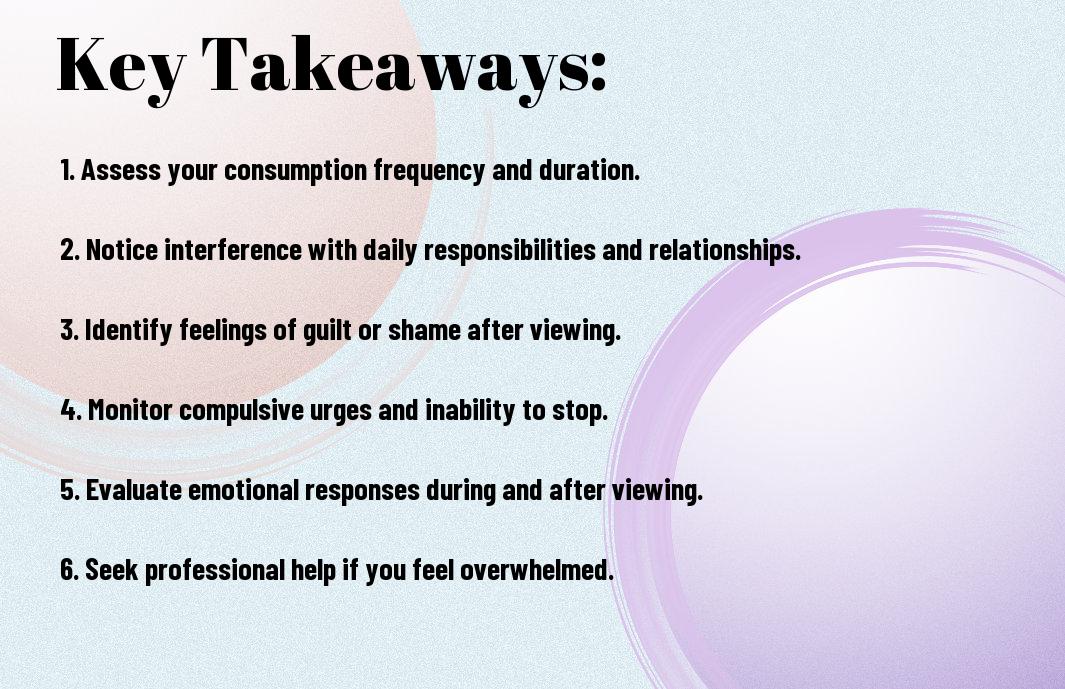Just understanding the signs of porn addiction can empower you to take control of your life. It’s necessary to recognize the impact this habit may have on your relationships, work, and overall well-being. In this post, you will learn how to identify the symptoms of porn addiction and develop a breakthrough action plan tailored to help you regain balance and reclaim your time. By reflecting on your habits and implementing effective strategies, you can make positive changes towards a healthier lifestyle.
Key Takeaways:
- Identify the signs of porn addiction, such as compulsive behavior, neglect of responsibilities, and loss of interest in real-life relationships.
- Understand the impact of porn on mental health, including potential feelings of guilt, anxiety, and depression.
- Acknowledge the difference between casual consumption and addiction; seek to assess your personal viewing habits objectively.
- Consider keeping a journal to track your usage and emotional responses related to porn consumption.
- Explore alternative coping mechanisms and healthy outlets, such as exercise, hobbies, or engaging in social activities.
- Reach out for support from trusted friends, family, or professional counselors to discuss your concerns and feelings.
- Educate yourself on resources and strategies for breaking free from addiction, including online communities, workshops, or therapy options.


Understanding Porn Addiction
Before confronting a potential porn addiction, it’s imperative to grasp what it truly entails. Porn addiction can significantly impact your life, relationships, and mental health. Many individuals struggle with compulsive behaviors surrounding pornography consumption, making it vital to assess your habits critically.
Defining Porn Addiction
Porn addiction refers to an overwhelming dependence on pornography that interferes with everyday life. This behavior goes beyond occasional use, becoming habitual and difficult to control, ultimately leading to adverse consequences. By identifying whether you’re using porn as a coping mechanism or escape, you can start understanding your relationship with it.
Signs and Symptoms
Understanding the signs and symptoms of porn addiction is the first step toward recognizing a problem. Common indicators include spending excessive time viewing porn, neglecting responsibilities, and feeling anxiety or irritability when access to porn is restricted. These signs can manifest as a compulsion to watch porn despite negative impacts on your life.
Addiction often leads to an escalating need for more explicit content, as what once satisfied you may no longer hold the same appeal. If you find yourself increasingly reliant on pornography for pleasure or stress relief, it may be time to reflect on your habits. Other signs include social isolation, problems in relationships, and using porn as a primary source of intimacy or excitement, which can hinder your ability to engage in healthy connections with others.

The Psychological Impact
Now, recognizing the psychological impact of porn addiction is vital for understanding your struggle. Engaging with pornography can lead to distorted perceptions of intimacy and relationships, often resulting in feelings of isolation and shame. These psychological effects can significantly hinder your ability to form healthy connections and can contribute to a cycle of dependency that harms your mental well-being.
Emotional Effects
After becoming ensnared in porn addiction, you may experience a range of emotional effects, including anxiety, depression, and feelings of guilt or shame. These emotions can leave you feeling inadequate and disconnected, further perpetuating your reliance on porn as a coping mechanism. This emotional toll can make it difficult for you to navigate everyday life, rendering you more susceptible to withdrawal symptoms when you attempt to cut back.
Behavioral Consequences
For many individuals, porn addiction can lead to significant behavioral consequences that adversely affect your daily life. You may find yourself prioritizing porn over personal relationships, work responsibilities, and other important activities. This compulsive behavior not only strains your interpersonal relationships but can also hinder your professional growth.
Indeed, the behavioral consequences of porn addiction extend beyond mere distraction; they can manifest as neglect of responsibilities, poor work performance, and difficulty maintaining focus. You may experience an increase in secrecy, which can harm your relationships with loved ones. Over time, these behaviors can further entrench your dependency on pornography, making it increasingly challenging to break the cycle. Recognizing these patterns is vital for developing a plan to regain control over your life and relationships.

Assessing Your Relationship with Porn
Unlike many habits, your relationship with porn can be subtle and complex, often blending into your daily life without significant awareness. To truly gauge the impact it has on you, consider how frequently you engage with it, the emotions tied to those instances, and whether it affects other areas of your life—such as relationships, work, or self-esteem. A candid reflection on these factors can help you understand the nature of your consumption.
Self-Assessment Techniques
Porn addiction often goes unnoticed, making self-assessment techniques an invaluable tool for gaining insight into your habits. Take time to journal your experiences, including your feelings and triggers associated with porn use. Setting aside regular periods for self-reflection can bring clarity, revealing patterns in your consumption and its effects on your daily life, allowing you to take informed steps toward change.
Seeking Professional Help
Relationship with porn can be challenging to navigate alone, and professional support can be beneficial in your journey toward understanding and recovery. A therapist who specializes in sexual health or addiction can offer personalized strategies and coping mechanisms, guiding you through your feelings and behaviors while addressing underlying issues that may contribute to your habits.
But seeking professional help is not a sign of weakness; it’s a proactive step towards reclaiming your life from unhealthy patterns. A qualified therapist can provide you with structured guidance, helping you explore the emotional triggers that lead to excessive use and facilitating discussions that may reveal deeper concerns. Treatment can include cognitive-behavioral therapy or support groups that empower you with the tools needed for positive change. Engaging with a professional can foster accountability and enhance your capacity to overcome challenges in your relationship with porn.
Breaking Free from Addiction
Once again, the journey to breaking free from addiction requires determination and a proactive approach. You must commit to making changes in your daily habits and emotional health. Surrounding yourself with the right support network, setting clear goals, and actively participating in recovery activities can help you regain control and lead a fulfilling life without the constraints of pornography addiction.
Developing a Recovery Plan
Above all, creating a structured recovery plan is important for your healing process. Outline specific steps you will take each day to reduce your exposure to triggers, seek professional help, or join a support group. Regularly evaluating your progress can keep you motivated and focused on your ultimate goal of breaking free from addiction.
Strategies for Overcoming Triggers
To effectively manage and overcome triggers, you need to identify what specifically prompts your urges and develop personalized strategies. This can include avoiding certain environments, learning stress-management techniques, and finding healthier activities to engage in as distractions. Building awareness about your triggers will empower you to combat them head-on.
Recovery from addiction involves not only recognizing your triggers but also developing comprehensive strategies to face and overcome them. This might include practicing mindfulness, limiting access to devices that facilitate viewing pornography, or employing relaxation exercises when you feel the urge to revert to old habits. Engaging in new hobbies and fostering social connections can also fill the void that pornography may have occupied. By actively addressing triggers and employing these strategies, you pave the way toward a healthier, addiction-free life.
Support Systems
Keep in mind that establishing a support system is vital in your journey to overcoming porn addiction. Connecting with others who understand your struggles can provide encouragement and accountability. Whether through support groups, online forums, or trusted friends and family, having a network can make a significant difference in your recovery. Having individuals who empathize with your situation allows you to share experiences and celebrate progress together, enhancing your overall motivation and resilience.
Finding Community Support
The search for community support can lead you to various resources such as local support groups or online communities specifically tailored for individuals facing similar challenges. Engaging in these spaces not only fosters connection but offers shared insights on overcoming addiction. By participating actively, you can exchange strategies and celebrate each other’s victories, reinforcing your commitment to change.
The Role of Therapy
Role of therapy can be transformative in addressing the underlying issues related to your porn addiction. With the guidance of a qualified therapist, you can explore the emotional and psychological factors that contribute to your behavior. Therapy provides you with a safe space to express your feelings and develop healthier coping mechanisms, which are crucial for long-term recovery. It also allows you to work through any feelings of shame or guilt while helping you gain insights into your patterns and motivations.
With professional support, therapy can help you understand the root causes of your addiction, enabling you to confront them head-on. This process encourages self-reflection and personal growth, empowering you to make informed choices moving forward. Additionally, a therapist can assist in developing personalized coping strategies and practical skills that you can use in everyday situations, making your recovery path more manageable. Engaging with a professional can reinforce your commitment and provide tailored support as you work toward a healthier relationship with yourself and others.
Maintaining Recovery
Despite the challenges you may face during your recovery journey, consistency is key to staying on track. It’s imperative to regularly assess your progress and adapt your strategies as needed. Engaging in supportive communities can provide valuable insights and encouragement that reinforce your commitment. Establishing healthy routines and avoiding triggers will help solidify your newfound habits, ensuring long-term success. Keeping your focus on self-improvement will empower you to lead a fulfilling life beyond addiction.
Building Healthy Habits
Behind every lasting recovery are healthy habits that support your journey. Incorporate activities that promote well-being, such as exercise, mindfulness, and engaging social interactions. These habits not only distract from urges but also foster a sense of accomplishment and self-worth. By focusing on constructive activities, you create a robust foundation for a balanced life free from pornography.
Long-Term Strategies for Success
One vital component of long-term recovery is the implementation of effective strategies that help you stay grounded. Having a plan in place for when cravings arise is beneficial. This may include identifying your triggers, utilizing coping techniques, and developing a support network that can provide motivation and accountability. Recognizing that setbacks can occur allows you to approach recovery with a mindset focused on resilience and growth.
Strategies for embracing long-term success involve consistently evaluating and adjusting your approach. Maintain a journal to track your feelings, achievements, and challenges, as this can provide insights into patterns and areas for improvement. Consider seeking guidance from a mental health professional or support groups to reinforce your commitment. Ultimately, dedicating time to personal growth and creating a balanced lifestyle will anchor you in recovery, making it easier to resist the pull of old habits.
Final Words
From above, you now have the tools to assess whether you might have a porn addiction and the first steps towards recovery. Being aware of your habits and their impact on your life is important for growth and healing. Consider reflecting on your feelings, behavior, and relationships with yourself and others. If you identify troubling patterns, take proactive measures to address them—whether through self-help strategies or seeking professional help. Your journey towards a healthier relationship with pornography can start today, empowering you to regain control and enhance your well-being.
FAQ
Q: What are the signs that I might have a porn addiction?
A: Common signs include spending excessive time viewing porn, feeling unable to control your consumption, neglecting responsibilities or relationships, experiencing withdrawal symptoms when not engaging with porn, and feeling shame or guilt after viewing.
Q: How can I assess the impact of porn on my daily life?
A: Evaluate how frequently you engage with porn and whether it disrupts daily activities, affects relationships, or interferes with work or school. Also, consider if you’re sacrificing social interactions or hobbies for porn consumption.
Q: What steps can I take to start addressing a potential porn addiction?
A: Begin by tracking your porn consumption patterns. Set limits on viewing time and establish non-porn-related activities to fill that time. Seek support from friends, family, or professionals who can guide you on this journey.
Q: Are there any resources or programs specifically designed to help with porn addiction?
A: Yes, there are various online platforms, support groups, and counseling services offering resources and treatment plans tailored for porn addiction. Look for organizations specializing in sexual health or addiction recovery for further assistance.
Q: How can I build a support system for overcoming porn addiction?
A: Reach out to trusted friends or family members who can provide encouragement and accountability. Consider joining a support group, either in person or online, where individuals can share experiences and strategies for overcoming addiction together.
Q: What if I feel embarrassed or ashamed to seek help for my porn addiction?
A: It’s common to feel this way, but it’s important to acknowledge that many people struggle with similar issues. Seeking help is a sign of strength, not weakness. Professional therapists are trained to handle such situations with empathy and confidentiality.
Q: Can overcoming porn addiction lead to improvements in my overall well-being?
A: Yes, many individuals report enhanced mental clarity, better emotional regulation, stronger relationships, and increased motivation to pursue personal goals after addressing their porn consumption. Focusing on healthier habits can lead to significant lifestyle improvements.
